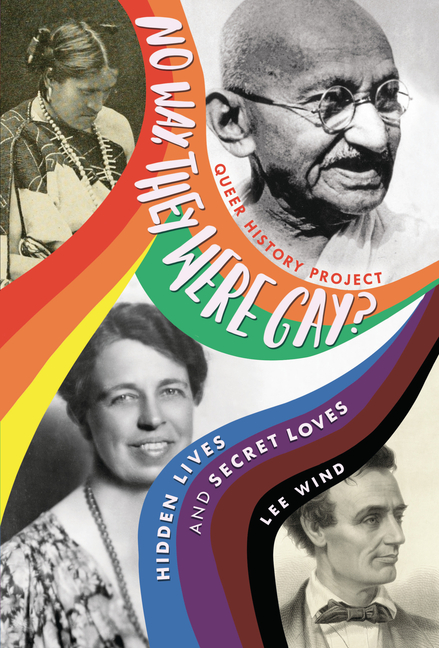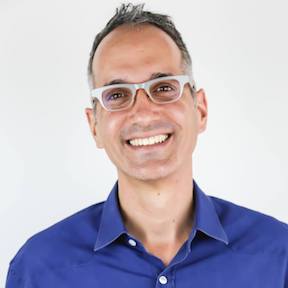Meet-the-Author Recording with Lee Wind
No Way, They Were Gay?: Hidden Lives and Secret Loves |
Lee Wind introduces and shares some of the backstory for creating No Way, They Were Gay?: Hidden Lives and Secret Loves.
Translate this transcript in the header View this transcript Dark mode on/off
Lee Wind: Hi, my name is Lee Wind and I'm the author of No Way, They Were Gay?: Hidden Lives and Secret Loves. I'm gay, and growing up, I felt so alone. I felt like I was the only guy that liked-liked other guys in the history of the world. And when it came to history in school, it was really taught as medicine, names and dates to memorize. And it was also taught as the only important people in history were rich white able-bodied men from Europe who were straight and cis-gendered. And I didn't see any reflection of myself in there, so I gave up on history.
I didn't come out I was gay until my twenties and I dated girls, and the whole time I dated girls, I kept judging it that it was the right thing to do. It was what my parents wanted me to do. It was what society wanted me to do, but I didn't feel it. I kept hoping, would the feeling come? And it didn't. I finally got honest with myself and everyone else. And then fast-forward, about 11 years ago, I heard a talk by the late Randy Harrison, not the actor, a different Randy Harrison, about Abraham Lincoln's letters to Joshua Fry Speed, and the letters convinced him that Abraham was in love with Joshua. And I was like, "Whoa, that can't be true." It just blew my mind.
But I went to the library, because I couldn't stop thinking about it. And I got out the letters and I read the primary source materials. So Lincoln and Speed had been very close friends and they had lived together for four years and they'd shared a bed for four years. (And by the way, a lot of historians think that that was really typical in the frontier) And then after that period of time, Joshua moved back to Kentucky and married a woman named Fanny, and six months later, Abraham writes him a letter and asks him, "Are you now in feeling, as well as judgment, glad that you're married as you are? From anybody but me this would be an impudent question not to be tolerated, but I know you'll tolerate it from me."
And I read it and I got goosebumps, because it was exactly how I felt as a young kid dating girls. I judged it, but I didn't feel it. And suddenly in this incredible moment of insight, there I was in history. Maybe Abraham Lincoln was in love with Joshua Fry Speed, and maybe I'm not the first guy to like-like other guys in the history of the world. It just cracked open that false facade of history.
And suddenly it was like, Wait a minute. Maybe history is the story of people that aren't necessarily rich. Maybe it's the story of people without money. Maybe it's not just about white people. Maybe it's the stories of people of color. Maybe it's not just able-bodied people but the stories of disabled people. Maybe it's not just about men; maybe it's about women and people of other genders. Maybe it's not just from Europe. Maybe it's from people all over the world. Maybe it's not just straight people. Maybe it's also men who love men and women who love women and people who love without regard to gender. And maybe it's not just cisgender people. Maybe it's people who lived outside of gender boundaries.
So then I got really excited. Wow, wouldn't that make an incredible book? A book that would help tear down that false facade of history. And I thought, "But I hated history when it was taught to me in school." So I thought, well, instead of teaching history or telling history as medicine, what if we did it as chocolate? What if we made it really fun? Pop-up videos, with funny asides, and using the primary sources to really leverage the voices of the people themselves, so using poetry and memoir and news clippings and ancient artwork and really digging into it.
Even in the queer community, it's funny. When we talk about history, everything's about 1969, the Stonewall Rebellion and afterwards, and there's this sense that nothing happened before it, but there are these stories from thousands of years ago, like Sappho, like the Pharaoh Hatshepsut, like Shakespeare. Okay, well, Shakespeare was only a few hundred years ago, but across time and around our world. And I love that idea that if LGBTQ kids and teens know that they have a place in the past, then they'll know that they deserve a place at the table today. And if they know that they have a place at the table today, I think that they can imagine a future that could be anything. And that is really where it's all about for me. It's all about empowering young people.
I want to read the opening bit from the book. It's the beginning of the introduction and then the end of the introduction. And it starts out:
Hidden History.
History sounds really official, like it's all fact, like it's what happened, but that's not necessarily true. History was crafted by the people who recorded it. Imagine you got into a fight at school. Afterward, there will be different versions of what happened. You'll have your story, the other kid will have their story, and a third person who maybe saw the fight happen will have a third story. Whose story will the principal believe? Which version will become the official story, the history of that moment? What if that third person doesn't like you? What if that third person is your best friend? What if your fight was with the principal's kid? Whose story will become history now?
In the same way, many stories of the past were changed by those in power to support the people they liked, the beliefs they held, and the things that were important to them, such as keeping their power. Some historians may have tried to protect people they cared about from stigma and laws that might have targeted them. Other historians were biased against, didn't see, or couldn't even imagine anyone different from themselves.
The result? History has often left out the stories of women, people of color, disabled people, and LGBTQ people -- men who loved men, women who loved women, people who loved without regard to gender, and people who lived outside gender boundaries.
So this is skipping ahead to the end of the introduction.
These days, so many gay and bi men who loved men, lesbian and bi women who loved women, and transgender, genderqueer and gender-nonconforming people are out and open about their lives. And it can seem as if this is a new thing, that in our grandparents' time and in their grandparents' time, love between men, love between women, and people living outside gender boundaries didn't happen, or at least not as much, it turns out that's not necessarily true. There's a proud, yet mostly hidden, history across the world and throughout time, and that's what we're setting off to explore.
This Meet-the-Author Recording with Lee Wind was exclusively created in March 2021 by TeachingBooks with thanks to Lerner.



